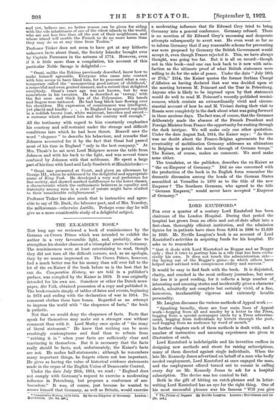THE EX-KAISER'S BOOK.*
Nor long ago we reviewed a book of reminiscences by the German ex-Crown Prince which was intended to exhibit the author in a very favourable light, and, probably, also to strengthen his slender chances of a triumphal return to Germany. The reminiscences were at least entertaining to read, though they did not turn all the difficult corners, and, as an apologia, they by no means impressed us. The Crown Prince, however, had a much better run for his money than will ever fall to the lot of the ex-Kaiser if the book before us is the best that he can do. Comparative History, we are told in a publisher's preface, was compiled by the Kaiser in 1919. It was originally intended for his own use. Somehow or other the Dutch news- paper, Het Volk, obtained possession of a copy and published it. The book consists simply of tables of dates and events, beginning in 1878 and ending with the declaration of war in 1914. No comment clothes these bare bones. Regarded as an attempt to impress the world with " the eloquence of facts," the book is pathetic.
Not that we would deny the eloquence of facts. Facts that speak for themselves may make out a stronger case without comment than with it. Lord Morley once spoke of " the irony of literal statement." He knew that nothing can be more crushingly contemptuous and final than to refrain from " rubbing it in " when your facts are sufficiently clear and convincing in themselves. But it is necessary that the facts really should be facts, and, unfortunately, the Kaiser's facts are not. He makes half-statements ; although he remembers many important things, he forgets others not less important. He gives as having the value of historical evidence statements made in the organ of the English Union of Democratic Control.
Under the date July 26th, 1914, we read : " England does not comply with Germany's request to exercise a moderating influence in Petersburg, but proposes a conference of am- bassadors." It was, of course, just because he wanted to assure himself that Germany, as well as Britain, would exercise
• Comparative History. 1878-1914. By the ea-Emperor of Germany. London : Hutchinson. Ws. ed. net.1 a moderating influence that Sir Edward Grey tried to bring Germany into a general conference. Germany refused. There is no mention of Sir Edward Grey's unceasing and desperate attempts subsequently to avert war. He even went so far as to inform Germany that if any reasonable scheme for preventing war were proposed by Germany the British Government would accept it, even though France rejected it. This, we have always thought, was going too far. But it is all on record—though not in this book—and one can look back to it now with satis- faction as the ultimate proof of what British statesmen were willing to do for the sake of peace. Under the date "July 26th or 27th," 1914, the Kaiser quotes the former Serbian Charge d'Affaires as having declared that war was decided upon at the meeting between M. Poincare and the Tsar in Petersburg. Anyone who is likely to be imposed upon by that statement would do well to read M. Poincares recently-published remini- scences, which contain an extraordinarily vivid and circum- stantial account of how he and M. Viviani during their visit to Russia were completely in the dark about what was going forward in those anxious days. The fact was, of course, that the Germans deliberately made the absence of the French President and Foreign Minister from France the opportunity for rushing through the dark intrigue. We will make only one other quotation. Under the date August 2nd, 1914, the Kaiser says : " As there was no doubt about the Franco-Belgian agreements for the eventuality of mobilization Germany addresses an ultimatum to Belgium to permit the march through of German troops." The Kaiser, of course, makes no comment. We need make none either.
The translator, or the publisher, describes the ex-Kaiser as " the ex-Emperor of Germany." Did no one concerned with the production of the book in its English form remember the dramatic discussion among the heads of the German States assembled at Versailles in 1870 as to the title of the new Emperor ? The Southern Germans, who agreed to the title " German Emperor," would never have accepted " Emperor of Germany."


































 Previous page
Previous page